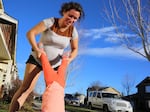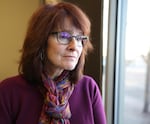Redmond mother Michelle Winter was on a cocktail of methamphetamine and alcohol when she had her two children.
Her son became so malnourished, doctors thought he might die.
She said she's been clean for a year now but remembers being so out of control, she signed over power of attorney and her kids to her mother.
“I don’t think I really cared," Winter said. "That drug is so incredibly ... it takes over your mind, body and soul. If I were sober and had been put in that situation, I’d be like: ‘No, I’m going to fight for them. They’re my kids.’ Then? I don’t think I cared.”

After years struggling with alcohol and meth, Michelle Winter is working hard to get full custody of her children.
Kristian Foden-Vencil / OPB
Winter is working with her mother to get her kids back. But she’s pregnant again.
Because of her drug history, she went straight to the St. Charles Center for Women’s Health in Redmond. It recently started a program for "drug affected" pregnant women.
The number of newborns going through drug withdrawal has increased fivefold since 2000.
Dr. Barbara Neuman started the MOMS program at St. Charles and says pregnancy turns out to be a good time to kick the habit, “I think it’s a scare sometimes. Or an opportunity," she said.
"Suddenly they realize that they’re responsible for someone other than themselves. And maybe they question some of their lifestyle choices.”
Every pregnant woman who arrives at St. Charles now gets a drug test — and it’s very sensitive. You can get a positive result from cannabis smoked four weeks earlier.
Newborns With Drug Withdrawal
Oregon's rate of newborns with drug withdrawal is increasing.
Source: Oregon Hospital Discharge, 2000-2014 / OPB
In fact, about two-thirds of the women who test positive, test positive for cannabis. And as "mandatory reporters," medical staff have to inform the state.
But casual users of legal drugs do not need to get overly concerned.
Jay Wurscher, the alcohol and drug coordinator with Oregon Child Welfare, said his office gets 80,000 calls about safety every year, so when it comes to drugs and pregnancy, they’re letting the health system take the first steps.
“The carrot-and-stick analogy works,” he said.
The stick is the drastic and very rare move of taking custody of a new baby. The carrot is giving women with drug problems what they need to turn things around.

Dr. Barbara Neuman started the MOMS program at St. Charles. She says pregnancy is a good time for women to kick the habit. “I think it’s a scare sometimes. Or an opportunity. Or suddenly they realize that they’re responsible for someone other than themselves.”
Kristian Foden-Vencil / OPB
“It used to be really difficult to get a physician on the line or a nurse to talk to you from a hospital setting. But that’s dramatically changed,” he said.
Wurscher said they’re finding that women are often more open to help when it comes from a health worker than the state.
“They have to face all that shame," Wurscher said. "They have to face withdrawal from the drug that they’re using. They have to face sometimes criminal things that they’ve done … so what is it that will bring that person towards recovery?”
If a pregnant woman keeps testing positive during her visits to St. Charles, she's matched with a peer counselor like Mary Selken.
“I spent 20 years drinking and using methamphetamines,” Selken said.
Selken, now clean for 11 years, said her addiction struggles allow her to help women in a way that "white-coated doctors just can’t.
“It’s as simple as someone being able to talk to me and knowing that they can tell me anything that’s going on in their life, and I’m not going to judge them because I’ve probably been there and I’ve probably done it worse,” she said.

St. Charles Center for Women’s Health in Redmond recently started a program for "drug affected" pregnant women because there are so many.
Kristian Foden-Vencil / OPB
Looking at Selken, you’d never guess her history. So she keeps an old mug shot — complete with her meth-scabbed face — to show doubters.
It's Selken's job to match women with the things they need. “You know I pick up a girl from the end of a road. And she comes out from her homeless camp and then we go and take care of whatever needs to be taken care of,” she said.
That can be food, rent, even propane — being homeless in the High Desert requires heat.
Selken and St. Charles also uses a system of incentives. Women earn points toward a rocking chair or diapers in exchange for going to their well-baby checks and immunization appointments. One premature baby, held in the intensive care unit for three weeks, can cost a quarter of a million dollars.
So the comparative cost is minimal, said clinic manager Tricia Clay. “If we can get in the forefront and get them to their appointments. Healthier moms have healthier babies and then our overall cost in health care can be reduced.”
St. Charles spokeswoman Lisa Goodman thinks the program will have benefits far down the line as women living outside the mainstream are pulled into the health care system.
“Mary stays engaged with each of our moms through the first five years of their baby — until they enter school," said Goodman. "During that time, life happens and they’re still trying to learn how to deal with life in a clean and sober way.”

Michelle Winter and mother, Vivian Hight, are working to bring the family together again. Hight says Mary Selken has been invaluable. "I could trust her to talk my daughter off a ledge.”
Kristian Foden-Vencil / OPB
In her work, Selken has helped Michelle Winter make all her prenatal check-ups and stay away from drugs. Winter says she has family for support but still needs Selken.
“I mean I’ve straight sat here on more than one occasion and bawled my eyes out in front of her and been like blubbering ... Her being a mom, an addict, and ex-addict or whatever you want to call it, I can relate to her,” Winter said.
Winter's mother, Vivian Hight, said Selken can reach her daughter in a way she cannot. “This is my adult daughter. I cannot rope her and tie her and drag her into my home and force her to do what I know will be best for her.”
